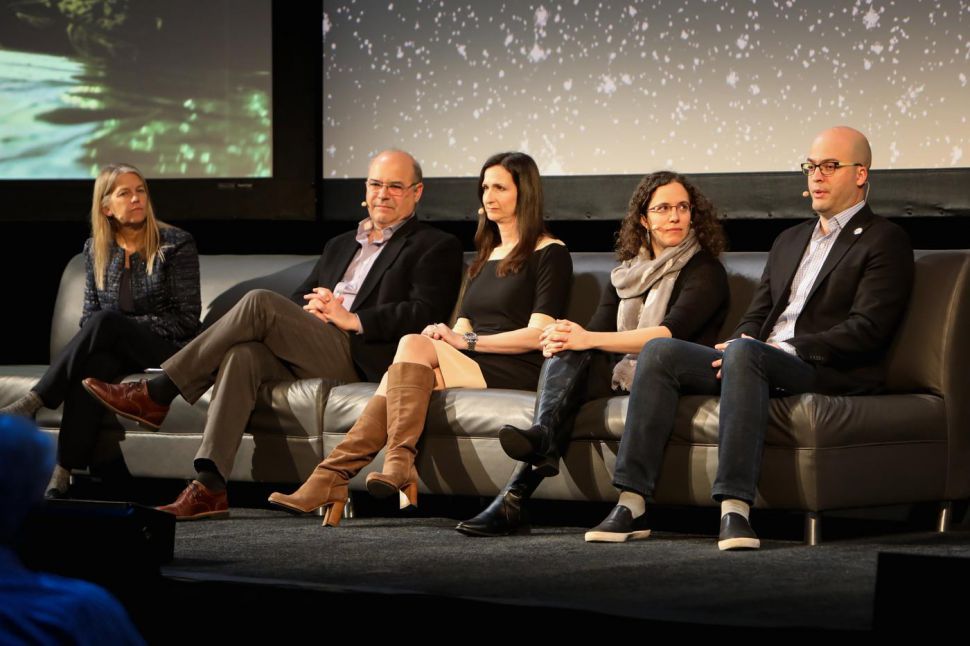The Future’s Coming: Why We Need to Prepare for Sci-Fi Tomorrows Today
by Sarah Wells March 17, 2019 (space.com)
• On March 14th, at the ‘Beyond the Cradle’ conference from the Massachusetts Institute of Technology Media Lab in Cambridge, Massachusetts, a panel of science fiction creators (pictured above) Ytasha Womack, Daniel Suarez and Marc Okrand shared their ideas on sci-fi futures. The trio argues that science fiction provides an important opportunity to expand the scope of our own cultural perspectives. (see 2:40 minute video of William Shatner discussing science fact vs science fiction below)
• “I think a lot of the science that we work towards is sometimes inspired by what we see in science fiction,” said Womack who explores ‘Afrofuturism’. “[I]t can really continue to help… [in] creating possible utopian societies.”
• Sci Fi also tends to focus on future dystopias. By imagining societies of the future, we can explore how to improve human relations today, and in some cases even shine a harsh light on the ways our society has failed to live up to the standards we write about, says Womack. For example, the term ‘alien’ has developed a negative image of illegals or people different from ourselves.
• The panelists urge Sci Fi enthusiasts to take a positive approach to meeting people who are different here on earth, just as we would hope to do with extraterrestrial beings one day – to search for commonalities among humans instead of differences, and imagining ourselves as intergalactic beings unified by a sense of responsibility to something greater than ourselves. This can be an empowering experience for people.
• Marc Okrand, a linguist known for creating “Star Trek’s” Klingon language, thinks that it is important to view extraterrestrial aliens, or different people here on earth from an interpersonal level – not conforming to our own societal model, but to recognize another being’s or person’s perspective.
• Ariel Ekblaw, the coordinator of the conference and founder of the Media Lab’s Space Exploration Initiative, said the focus of the day was to explore ways to democratize space and make it accessible not only to people all around the world, but also across many disciplines, including technology, art and design. “The idea is… to show [everyone] all here together, talking together and co-designing the future of space,” said Ekblaw.
• “In many ways, we’re living in a sci-fi future already,” says panelist Daniel Suarez. Suarez’s approach to Sci Fi writing is to combine technology and culture to imagine a future where humanity can believe in a common goal, and imagine themselves as a single human race. “I try to bring my readers through the issues and challenges we’re going to be facing.” It can help people feel like they have a stake in these stories and their futures, says Suarez.
• Womack explains the value of imagining our collective future, “Imagination can be a tool of resilience to help people…envision a future. And envisioning a future then inspires them to feel like they have [a stake] in that future and take steps to create the kind of world that values humanity.”
CAMBRIDGE, Mass. — The technological utopias of science fiction may still be centuries away, but building the culture of that future starts now, a trio of sci-fi creators said.
On a panel at the ‘Beyond the Cradle’ conference on March 14, from the Massachusetts Institute of Technology Media Lab, science fiction creators Ytasha Womack, Daniel Suarez and Marc Okrand shared their ideas on sci-fi futures.
The trio discussed their perspectives on science, fiction and culture, arguing that this intersection not only creates an important opportunity to expand the scope of our own perspectives but also provides agency for those often left out of the conversation about space exploration.
“I think a lot of the science that we work towards is sometimes inspired by what we see in science fiction,” said Womack, producer, director and author of works exploring Afrofuturism. “One of the exciting possibilities around sci-fi is that it can really continue to help push this notion of what we can create, especially as it comes to creating possible utopian societies.”
Or dystopias, which popular science fiction and young adult novels tend to focus on. Womack said that while readers have an interest in dystopian stories of the future, many peoples and communities today are already living in their own forms of dystopias. By imagining societies of the future, we can explore how to improve human relations today, and in some cases even shine a harsh light on the ways our society has failed to live up to the standards we write about, Womack added.
One such disconnect is the way first contact with aliens is typically treated in fiction compared to how “aliens” on Earth are thought of and treated. While used in fiction to refer to extraterrestrials, Womack said that the initial meaning of the word “alien” simply referred to people on Earth who were different. “Even how we use it today around illegal aliens, or undocumented workers, I think it refers to a certain mentality around differences,” said Womack.
FAIR USE NOTICE: This page contains copyrighted material the use of which has not been specifically authorized by the copyright owner. ExoNews.org distributes this material for the purpose of news reporting, educational research, comment and criticism, constituting Fair Use under 17 U.S.C § 107. Please contact the Editor at ExoNews with any copyright issue.
